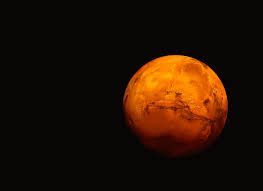Judy reads about Space
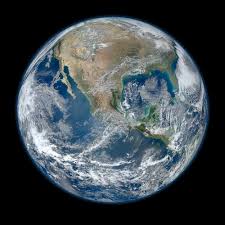 Like many people, I’m fascinated with space travel. I am in awe of astrophysics and the big brains of scientists who imagined space travel into real life. I marvel at the intelligence and the bravery of astronauts willing to be catapulted into the solar system strapped to rocket boosters and equally impressed with their ability to steer the craft expertly into orbit. The entire space program, from Earth to Milky Way, is a wonder to me.
Like many people, I’m fascinated with space travel. I am in awe of astrophysics and the big brains of scientists who imagined space travel into real life. I marvel at the intelligence and the bravery of astronauts willing to be catapulted into the solar system strapped to rocket boosters and equally impressed with their ability to steer the craft expertly into orbit. The entire space program, from Earth to Milky Way, is a wonder to me.
But I am just a common person and my real questions about space travel are “what about that astronaut diaper?” and “how much worse is space sickness than drunken bed spins?”
Scott Kelly answers these shallow questions plus deeper ones in Endurance: a year in space, a lifetime of discovery. Scott Kelly is the U.S. astronaut who, along with the Russian Cosmonaut Mikhail Korniyenko, spent 340 days on the International Space Station (ISS) from 2015 to March 2016.
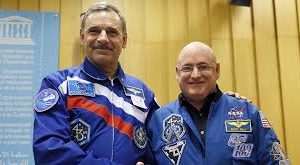
Reviewers of this book indicated it was different than other books about space because Kelly told it like it is. It’s a tell-all about space-dwelling from the glamorous to the mundane – from rocket science to bodily functions. Truthfully, I read it for a glimpse into the day to day life on the ISS.
What I learned…The diaper is used because they spend so much time in situations which stopping to take a whiz is impossible without calling off time-sensitive operations such as rocket launch and space walking. Putting on and taking off a pressurized suit takes hours. I guess I thought those suits had so many bells and whistles, there’d be some sort of pee vacuum, but no, they just “diaper up” as Kelly casually refers to it. Just part of the uniform. (I’ve read, since finishing Endurance, that a space suit with a built-in biffy is in development).
Space sickness? Way worse than bed spins. But there is variability and while Kelly sustains mild nausea and vertigo, for some, violent symptoms can last for many days. Kelly tells of one astronaut who, upon arrival to the ISS, used up every NASA barf bag on the station. The bags are specially suction-rigged to contain the contents, so they had to make-shift a facsimile that would work just as well as the original. If they couldn’t, the astronauts would have had to chase down, capture, and clean all the floating vomit globules. They succeeded in fashioning a new bag.
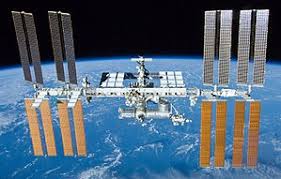
But I also learned…the ISS is the largest peacetime international project in history. It has been in use for more than 14 years. So it has been more than fourteen years since all humans were on the Earth at once. In the time it has been in use, the ISS has been visited by more than 200 people from 16 nations. When astronauts of different nations are there at the same time, they must answer to their own bosses from their prospective governments. Even sharing the same garbage bin takes international negotiations and grand declarations of what can be done when nations work together.
And…the personnel on the ISS are some of the most elite pilots in the world, yet their day to day business is not piloting the station. There is essentially no flying or piloting to do. They run other people’s experiments (dissect mice, tend to space gardens, take photos). They complete mandatory exercise to maintain muscle mass. They fulfil diplomatic duties such as skyping in on morning TV shows for interviews and writing blogs for school children. Also, importantly, they maintain equipment that could be their demise if not taken care of because, what might be a minor or medium emergency on earth, could end a mission—either by cutting it short, or by exploding the ISS and its inhabitants into outer space. They fix and repair the heating and air systems, “hygiene stations”, and the oxygen and co2 generators. They clean. Any floating bits of food, liquid, or bodily tissue must be captured because all substances floating in the station have potential to clog a filter or block a seal that keeps it pressurized and oxygenated. And on occasion they do basic dentistry and medical procedures so that lost crowns and ingrown toenails do not end in infection and sepsis requiring early return to Earth. On the ISS every detail must be attended to or the mission will fail. The inhabitants, no matter their nationality or government, must always be up for these tasks; they must always be on speaking terms, and trust each other’s’ capabilities in all kinds of situations. Their lives depend on each other.
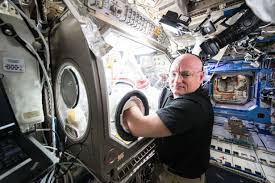
I liked this book. I liked learning about how one becomes an astronaut. Aside from being smart in science and maths, and not at all claustrophobic, you have to be a pretty even-Steven kind of personality. I liked learning that even if you have what appears to be quite a glamorous, one of a kind, dream job…it is still a job after all. Sometimes you don’t feel like working and sometimes you disagree with your bosses. I liked reading about the special foods and treats the astronauts would bring and get as packages and share with each other each Friday evening, the one day a week they all took time to socialize and have a meal together. (The Russians shared an MRE they referred to as “appetizing appetizer,” which was not appetizing, Kelly reported. And one cosmonaut brought his region’s traditional horse meat and horse milk to share.) I appreciated Kelly’s comparisons of real life in space to sci-fi movies. Sandra Bullock, floating through her spaceship in Gravity, was realistic, he said. When a spacecraft docks onto another and the doors open immediately in a hissy mist to allow visitors aboard, however, is not. In real life, docking, depressurizing, and boarding takes 4 or more hours. I liked learning that articles that have been out in space have a burnt smell about them.
But the book is not all “Dear Diary…” It is about the Year in Space Mission. Its purpose, among other things, was to obtain data regarding the sustained effects of micro-gravity on the human body. Scientists already know a fair amount about this. Micro-gravity is trouble for humans. Space-dwelling compromises the vestibular system (see “space sickness”), bone density, visual acuity, and the digestive system. Kelly writes about the effect of micro-gravity on him and his co-astronauts. So, with data from this mission, scientists will learn even more, and this information will help them plan and problem-solve for missions even farther away. Since Scott Kelly is an identical twin, his brother Mark (also an astronaut) will serve as his genetic control. Researchers should learn a lot about both the physiological and psychological effects of life in space through this rare opportunity for comparison.
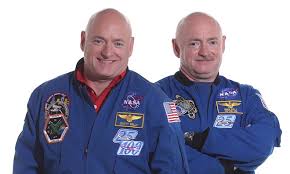
This book captured my imagination and got me contemplating human physiology in space as well as space cohabitation with other individuals, other cultures, and governments. Perhaps the civility and cooperation needed for survival on the teeny tiny scale of the ISS is the answer to the human condition on Earth and beyond.
The cosmos is within us. We are made of starstuff. We are a way for the universe to know itself—Carl Sagan.